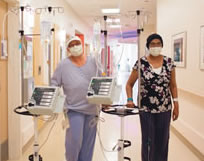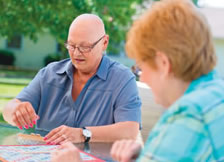Sharing Support

Photo by Edda Pacifico
A story of friendship as a pair of cancer patients help each other heal
Sherron Tornow says she's a lucky woman. After her physician diagnosed the lump on her neck as lymphoma, family, friends and neighbors rallied to offer support. She also shared her cancer experience with an unexpected new friend who was key to her support system: a fellow patient she met while preparing for a stem cell transplant.
"Rani and I met when we were having our stem cells harvested," Tornow says of patient Achamma (Rani) Geevarghese. "She was in the bed right next to me. She had been there for several days trying to harvest enough stem cells of her own. She finally got them."
Tornow got through the process of harvesting her stem cells within a few days.
"When I got ready to leave, Rani said to me, 'I hope we're in the hospital at the same time for transplants.' I agreed it would be nice to know somebody going through the same thing."
The 68-year-old Tornow, a mother of two and grandmother of six from Adrian, was surprised when, lo and behold, Geevarghese arrived at the Adult Blood and Marrow Transplant (BMT) service the day after she was admitted. She went to say hello immediately and get reacquainted.

Photo by Edda Pacifico
Barb Rose, L.M.S.W., a clinical social worker on the floor, says it's not uncommon for patients to meet during the harvest process and again for the transplant. And, though every patient must have an assigned healthy caregiver, it can be difficult for caregivers to understand issues facing patients during their three- to four- week inpatient stay. Patients can face depression, isolation and risk of infection from having no immune system.
"We never know how the body will react to transplant," Rose says. "Patients tell us nobody understands that fatigue or feeling as if you have to live in a bubble to prevent infection."
Unexpected illness, financial worries and emotional ups and downs can be difficult for any patient dealing with cancer, says Donna L. Murphy, L.M.S.W., C.C.L.S., co-director of the PsychOncology Program at the U-M Rogel Cancer Center. It is important for patients to ask and understand what support and services are available to reduce the burdens that cancer can bring.
"People are altruistic," Rose says. "They want to share their experience with someone else if it means helping them. Patients feel it’s meaningful if they can inspire someone else."
"We compared notes," Tornow says of the three-day period she received high doses of chemotherapy before her transplant. The friends checked in with each other to see how sick the other felt, what symptoms were being experienced and whether they felt like eating.
After both women had their transplants, Tornow suggested Geevarghese accompany her on a walk around the floor, something bone marrow transplant patients are encouraged to do daily. The two began walking the halls together regularly.
"She was a former school teacher, I was a deli manager," Tornow says. "We talked about food a lot because she couldn't eat much. Her husband would bring in Indian food. A sister-in-law came up from Texas and gave her great support and cooked for her."
While social workers address practical matters such as obtaining financial aid and understanding insurance issues, the main emphasis, says Rose, is on the mental health of patients and families dealing with all kinds of cancers. Rose and other social workers work with patients on an individual basis, as well as in groups, to share stories and experiences.
WhatNext is an online support network developed in partnership with the American Cancer Society. The site provides a way for individuals to share their cancer journeys and insights so others can get a better idea of what to expect during their own journeys. Find users most like you based on cancer type, treatment experiences and other diagnosis details. Visit whatnext.com.
"We have a weekly support group for patients and caregivers that is open to everybody including post-transplant patients," Rose says. "Every Wednesday before group, we go to patient rooms and invite them to participate and talk about why it's helpful to come to the group. We publicize the support group to clinic patients, as well."
The inpatient BMT nurses also hold occasional family fun days where patients and families gather to create an art project or do an activity that gives them the chance to relax and meet other people. On any given day, some patients arrange to meet in the family lounge to talk.
After 22 days in the hospital, Tornow was discharged; Geevarghese went home the next day. The two women continue to see each other at follow-up visits and plan to keep in touch despite living two hours apart. Tornow, now back in Adrian among family and friends, is thankful for her wide range of support.
"My neighbor Terri is a nurse," she says. "She goes to many of my appointments with me and helps me understand what the doctors are saying. We now take walks at 6 a.m. and are up to two miles."
Although Tornow must restrict her activity for 100 days to give her immune system time to rebuild, she is thankful to be home and cancer-free. She hopes to resume her normal hobbies, such as biking, riding horses and golfing, once she gets the "all-clear" from her doctor.
Sharing Support Resources
National Cancer Institute: Organizations That Offer Support Services
American Cancer Society: Online Communities and Support
Read the Fall, 2012 issue of Thrive.
